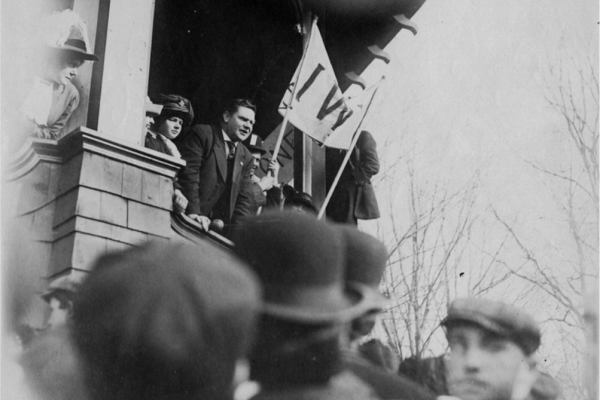Revisiting a forgotten high-seas struggle
As filmmaker Elaine Brière tells it, the merchant seamen emerged from the Second World War with a strong, progressive union, publicly lauded for their war effort, straddling a hugely profitable public enterprise that gave Canada the fourth-largest shipping fleet in the world. Yet just five years later, the ships were sold, the union was broken and most of the seamen were blacklisted as “Communists.” How and why this was orchestrated—and the ways it was resisted unsuccessfully—is the remarkable and moving story told in Betrayed, mostly by the now-aging seamen themselves.
Betrayed is a story with many threads. One takes up the merchant seamen’s stories: how they suffered terribly in the 1930s on the non-union merchant ships, how they struggled to unionize the Great Lakes shipping companies, how they suffered even more in the harrowing conditions of wartime dodging Germany submarines, and how they led postwar calls for decent jobs, wages and benefits for working people.
Another tracks the complicity of the Canadian state with private shipping interests to hinder union organizing in the 1930s, ply private industry with public money in wartime and ultimately sell off the publicly owned merchant fleet to private interests at bargain prices in the 1950s.
These stories pivot around key events in 1949, when the Liberal government made the decision to privatize the merchant ships. While the seamen attempted to defend public shipping, the government pulled out all the stops to defeat them, including whipping up anti-communist hysteria (with the aid of the compliant media), aiding corrupt American unions to raid the progressive Canadian Seaman’s Union and unleashing police forces to club any opposition into the ground. In response, what followed was arguably the largest international strike of the twentieth century, as workers in 26 countries supported the Canadian seaman by tying up sixty per cent of global shipping. But it wasn’t enough. Despite being publicly recognized heroes of the war and sporting views about public ownership that were generally accepted, the merchant seaman were abandoned by the public and the union movement. Most were never heard from again—until this film.
But the defeat of Canada’s merchant seaman in the early 1950s is not the end of the story for Brière. In line with the best tradition of historical documentary filmmaking, she goes further, linking the crimes of the past to crimes in the present—crimes like the unregulated conditions on contemporary merchant ships that allow seaman to die as old rustbucket ships sink regularly due to lack of maintenance. Or crimes like the continuing assault on merchant seamen’s wages and working conditions by the likes of former prime minister Paul Martin and his Canadian Steamship Lines company.
Betrayed is an important film, as it rescues the voices of working people and unearths a pivotal battle in Canadian labour history and the struggle for a national welfare state. With a run time of just 56 minutes, it arguably raises more questions than answers. Let’s hope, then, that with this outstanding example this will be only the beginning of a longer dialogue in film about these events and about the many other overlooked struggles of working people.
Dennis Pilon is an expert in Canadian politics and is an associate professor in the Department of Political Science at York University.
This article appeared in the September/October 2006 issue of Canadian Dimension (Good to the Last Drop).










